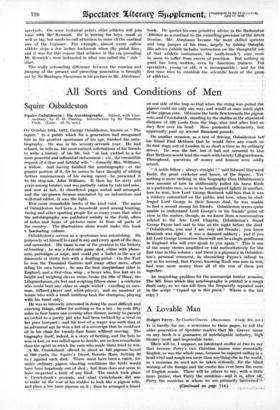A- Lovable Man
litillett Parry. By Charles Graves. (Macmillan. 2 vols. 30s. net.) Iz is hardly for me, a newcomer to these pages, to tell the older generation of Spectator readers that Mr. Graves' name on any book is a guarantee Of indefatigable industry, high literary merit and impeccable taste.
There _will be, I suppose, an intolerant scoffer or tivo to say that because Parry's two Christian names were essentially English, as was the whole man, because he enjoyed sailing in a head wind and rough sea more than anything else in the world, as a musician he need not be taken seriously, for the blind worship of the foreign and the exotic has ever been the curse of English music. There will be others to say, with a little more justice, that Parry the musician—and it is, after alt, Parry the musician in whom we are primarily interestedLa (Continued on page 714.). All Sorts and Conditions of Men (continued ,froni page 116)
was a big man, but not so big -a man that a striking portrait of him could not have been painted in one volume. True enough it is that Mr. Graves is certainly not writing for those in a hurry, and some readers may feel he has overloaded his book with such an exuberant wealth of detail that there is a real danger of his hero being crushed by irrelevancies or at least of his never emerging from his surroundings.
For my own part, I believe Mr. Graves took this risk de-
liberately and that (knowing his subject) he was right to do so. For if ever a man loved life and drew full measure from its diverse taps, that man was Hubert Parry. Everything inte- rested him ; nothing was so big that his lion-hearted nature was afraid of it ; nothing so small that he despised it. He loved the whole range of _humanity, a fact, I think, which expresses itself in the glorious optiinism and sanity of his music. His diaries, from which Mr. Graves quotes profusely, were kept with meticulous zeal, even at Eton, and if these two volumes had no other merits, they would still have been worth the writing for the interesting light they throw on social and musical history of the 'eighties and 'nineties, and on the personalities of the chief musical figures of that time— Joachim, Liszt, Hans Richter, Dannreuther, and Wagner, by whose powers as a conductor Parry appears to have been far more favourably impressed than were the majority of his contemporaries.
Writing of- Bayreuth in 1882 Parry (characteristically vigorous even in his diary) calls it a " barbarous city which is distinguished for its unsurpassable stinks and the stupidity and the backwardness of its inhabitants." But the first and " marvellously perfect " performance of Parsifal made ample amends. Yet he was not wholly pleased. " I was not satisfied with the climaxes of the first and last acts being chiefly scenic and not humanly emotional"—surely a very shrewd judgment.
It is interesting to note that Parry's sturdy radicalism and
love of being in the forefront of the battle was not confined to music. He was one of the first persons in London to appreciate the vision and dramatic force of Ibsen ; he was a close personal friend of the Gladstones and a convinced Home Ruler. The long story of his rise from musical obscurity to fame and honour is told by Mr. Graves with quiet force and modesty. The facts are allowed to-gpeak for themselves, and Parry would have been the first to wish his life presented in such a way.
I recall one personal instance of the charm of the man. The Eton College orchestra was rehearsing something of Parry's for some ceremonial occasion. I forget what all the bother was about, but I remember very clearly the intolerable con- fusion we were in, a muddle so cacophonous that it seemed as if the heavens must fall in. Suddenly the composer appeared at the end of the hall, a bluff figure of a sea captain, rubicund face, double-breasted reefer jacket, and the most disarming smile. Prompted by some instinct, I- tapped my bow on my violin stand in the correct professional 'rmmer ; the whole orchestra took it up., The smile spread slowly across Parry's face and his blue eyes danced with merriment. He reached his desk and took up his baton. " Gentlemen," he said, looking down on us, " I would rather have praise from my old schOol than from the rest of the world. ' I'm an old-rascal to have written such difficult stuff. Let's whack into it to- gether." We whacked into it together—and played it without a mistake ! Later in life I realized that a more stupid man would have said " boys "—and spoilt it all.
Something noble, something beautiful went out of English life when Hubert Parry died, and Mr. Graves is to be thanked for keeping his memory alive in these two admirable volumes. E. S. A.



























































 Previous page
Previous page